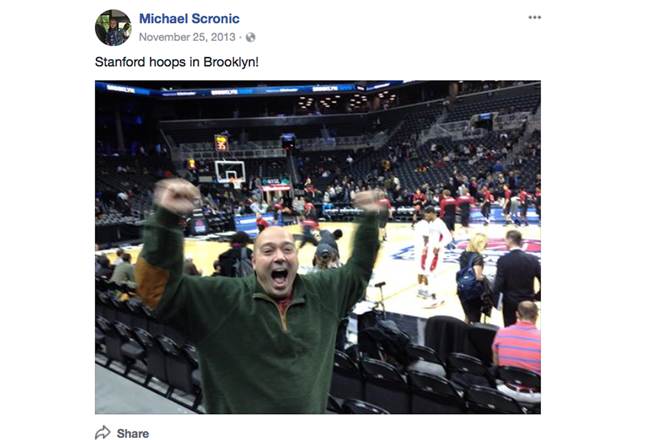Michael Scronic was sentenced yesterday to federal prison for eight years for running a Ponzi scheme that his lawyer depicted as the product of a gambling problem and federal prosecutors argued was mere greed to fuel a lavish lifestyle.
Scronic, 46, created a fictitious hedge fund in 2010 and ran it out of his home in Pound Ridge.

For seven years, he persuaded friends and family members ”“ including $50,000 from his mother ”“ to invest in his unregistered Scronic Macro Fund. He took in $24.5 million.
He repeatedly lied to 45 investors, according to court documents, telling them he was making money when he was really losing money.
In June 2017, for instance, he claimed $21.7 million in assets when he actually had $102,376.
Scronic pleaded guilty to securities fraud in March. Yesterday, U.S. District Judge Cathy Seibel sentenced him to 96 months in prison and three years of supervised release. She ordered him to pay $22 million in restitution.
Federal prosecutors wanted the court to imprison him for 12 1/2 years. The U.S. Probation Office recommended seven years.
Scronic”™s attorney, Alexei Schacht, argued for no more than three years.
“This case involves a tragic story of an accomplished person and once respected banker who descended into compulsive gambling,” Schact wrote in a sentencing memorandum.
Scronic, he said, accepts full responsibility for his crime. He has undergone tremendous personal growth since his arrest. He has put himself on the right path. He is unlikely to ever commit a crime again.
He regularly attends Gamblers Anonymous and Alcoholics Anonymous meeting, as well as Refugee Recovery, a Buddhist-based addiction recovery program.
Gambling “was in the family”™s DNA,” Schacht said. Scronic”™s maternal grandfather was a compulsive gambler. His mother gambled away his father”™s retirement savings. Scronic gambled excessively on cards, casino games and sports throughout his high school and college years.
When he worked as a Morgan Stanley trader from 1998 to 2005, “his gambling followed him to Wall Street, which was like a huge casino.”
He lost that job after losing millions of dollars on trades.
He received several hundred thousand dollars in severance money and increased it to $4 million, his attorney said, and then lost it all in two weeks. Then he lost his retirement savings and about $1 million from the sale of a condominium.
He borrowed $5 million from a college roommate and “gambled that money away” in 8 months, on high-risk, short-term options.
He continued to trade in ultra-risky options, Schacht said, with investments from friends and family.
On Oct. 5, 2017, the day he was arrested, he admitted himself to a hospital for psychiatric evaluation and seven days of observation.
Mental health experts diagnosed Scronic as a compulsive gambler, his lawyer said. One psychiatrist said his behavior could be explained in part by alexithymia, a dysfunction of emotional self-awareness and expression.
Expert opinions, according to Schacht, explain how he “kept chasing his consistent losing stock market bets and persisted in the delusion that he could eventually dig his way out of the hole and make his victims whole.”
Scronic”™s gambling, Schacht argued, may constitute diminished capacity and justify a lower prison sentence.
Greed, not a gambling addiction, motivated Scronic, Assistant U.S. Attorneys James McMahon and Daniel Loss argued in their sentencing memo.
He spent an average of $500,000 a year in stolen money on a luxurious lifestyle, including $12,275 a month to rent a 10-acre estate in Pound Ridge, a vacation home in Stratton, Vermont, club memberships and expensive vacations. He paid no taxes.
“He blames his criminal conduct on a newly-found gambling addiction and describes the great anguish he has been suffering as result of this ”˜disease,”™” the prosecutors wrote. But Scronic “never said a word about having a gambling problem or sought help for it until his arrest.”
The prosecutors were dismissive of the medical experts. They relied on Scronic for their diagnoses, they said, and never spoke to or reviewed evidence from prosecutors, FBI, the Securities & Exchange Commission or victims.
“According to the defendant,” the prosecutors wrote, “redemption is possible for him because his crimes arose from a gambling addiction, which ”˜can take hold of a good person and make them commit acts they can”™t even fathom.”™”
Scronic thinks his punishment should be lenient, the prosecutors said, because “he is the victim of a disease and should be admired for his perseverance in the face of adversity, instead of being incarcerated.”
A true compulsive gambler, they argued, would have used the stolen money to gamble. Instead, for seven years, he spent it on a lavish lifestyle, revealing his true mental state.
“He was driven,” the prosecutors said, “by greed.”





















